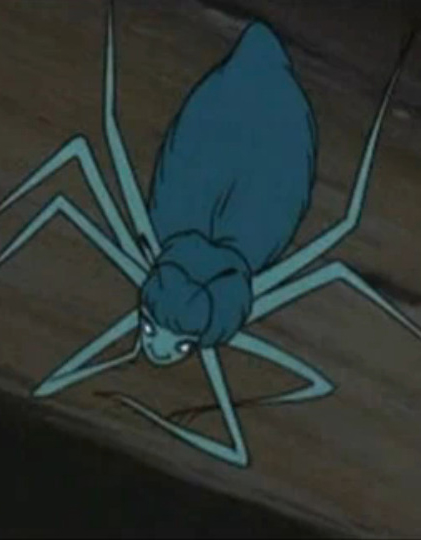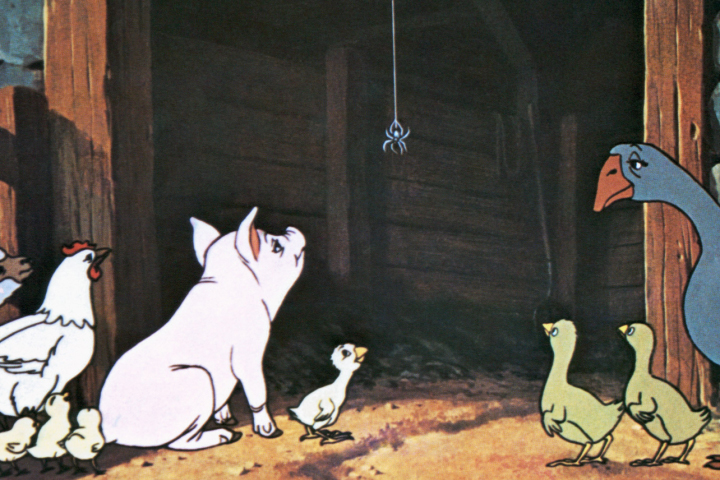TFE is celebrating the three Honorary Oscar winners this week. Here's Tim discussing Debbie Reynolds' first time as voice actor in an animated feature.
 Celebrity voice casting in animated films are older than you'd probably think, and usually as bad you'd probably expect. But sometimes, it works out well enough; sometimes, in fact, it turns into stone-cold classic cinema, as happened the first time Debbie Reynolds lent her voice to an animated feature. The film was Charlotte's Web from 1973, adapted from E.B. White's great 1952 children's book by Hanna-Barbera, the nation's leader in dismal television animation in the '60s and '70s. Ah, but Charlotte's Web is the exception: the handsomest and most emotionally rich thing Hanna-Barbera ever made by far, and Reynolds is the primary reason for that emotional richness.
Celebrity voice casting in animated films are older than you'd probably think, and usually as bad you'd probably expect. But sometimes, it works out well enough; sometimes, in fact, it turns into stone-cold classic cinema, as happened the first time Debbie Reynolds lent her voice to an animated feature. The film was Charlotte's Web from 1973, adapted from E.B. White's great 1952 children's book by Hanna-Barbera, the nation's leader in dismal television animation in the '60s and '70s. Ah, but Charlotte's Web is the exception: the handsomest and most emotionally rich thing Hanna-Barbera ever made by far, and Reynolds is the primary reason for that emotional richness.
She plays the title character, Charlotte A. Cavatica, a barn spider. Should I assume you've all read Charlotte's Web? You really ought to have. [More...]

If not, the story (book and film, which tracks it quite closely) is actually about a neurotic young pig named Wilbur, who grows fatalistically obsessed with the fear of being butchered and eaten. As one will. Charlotte lives in a web above Wilbur's pen, and commits herself to an act of kindness for the poor quivering creature: she concocts a scheme to stitch messages in her web declaring Wilbur a pig of the rarest and most special sort, knowing that the humans will take this for a divine miracle and allow Wilbur to live out his natural life in peace.
It's a fable about unconditional love, in other words. Charlotte is define by two traits: she is all-caring in her treatment of Wilbur, and she is all-wise, unsentimentally noting the inevitability of nature. Played right, it's the most heartbreaking and beautiful thing, and Reynolds plays it perfectly. She wanted the part badly – according to Joseph Barbera in his autobiography, she was willing to play the part for free (which, as we're learning, was something of a terrible habit for that actress) – and having snagged the role, she gave it her all. Reynolds invests Charlotte with a friendly, generous nature, delivering her lines with a deliberately calming pace and an audibly warm smile; she draws out the latent maternal quality in the writing and makes it the predominant aspect of the character. And she does this, moreover, without sacrificing Charlotte's authority or bluntness. When Reynolds speaks the lines in which the spider describes her predatory diet, it comes with a note of steel-clad defiance that her essential identity is important and true and not to be looked down on.
The mixture of raw honesty and cozy affection Reynolds brings to the character is the whole movie; White hated the adaptation, as is his right, but I frankly can't imagine any performer finding the heart of his book more precisely than this. She is earnest; she is comforting; she is devoid of pandering; when she arrives at the enormously traumatizing climax, in which Charlotte sleepily and contentedly announces that she's used up all of the life allotted to a single spider, she scores one of the most devastating moments in all of the notoriously matricidal genre of animated kids' movies.

Charlotte's Web also happens to be a musical (as though a family film made in '73 had any choice), which gives Reynolds a chance to show off in another register. The songs by the Sherman brothers aren't, generally speaking, anywhere near their best, but they did provide Reynolds with a ballad as well-suited to her exact range, vocally and emotionally, as anything she ever sang in a movie. "Mother Earth and Father Time" is an explicit repetition of the themes that dominate the whole movie (things change, loved ones die, autumn comes, and these truths can all be beautiful if you let them), and there's more than a little '70s corniness stuck between the notes. But Reynolds glides through it with a sweet, breathy delivery that redeems it and makes it one of the emotional highlights of the whole feature.
I find all of this so deeply moving, and Reynold's vocal work so resonant, that I'd even consider citing this as my favorite among all her performances in the movies. This is heresy, of a sort: we don't ordinarily consider vocal performances to "count" in those terms. But Reynolds' warm and nuanced work as Charlotte is a perfect argument as to why we should.